Dr. William “Bill” Maixner, the late Joannes H. Karis, MD, Professor of Anesthesiology, was a world-renowned pioneer in pain research and an extraordinary leader and mentor who believed that transformative discoveries come through collaboration. The Maixner Pain Research Symposium celebrates his legacy by bringing together pain researchers and specialists in North Carolina to share exciting new advances in pain research and management, stimulate collaborative opportunities, and promote professional development. Help preserve Dr. Maixner's legacy and grow our pain research community by making a gift to support this newly established symposium.
Overview
The second annual Maixner Pain Research Symposium brings together pain researchers and clinicians from North Carolina academic hubs, including Duke, UNC, NC State, and Wake Forest, to 1) share exciting new advances in pain research and pain management, 2) stimulate organic collaborative opportunities, and 3) promote professional development of early career students and trainees.
Target Audience
Clinicians, scientists, students, and trainees interested in pain mechanisms and management.
Learning Objectives
At the conclusion of this activity, participants should be able to:
- Understand multi-modal approaches for identification, validation, and screening of novel therapeutic targets for pain.
- Characterize molecular and cellular mechanisms of acute and chronic pain across the lifespan.
- Determine how biopsychosocial models can be applied to predict, prevent, and treat chronic pain.
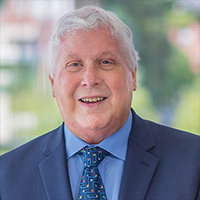
Dr. William “Bill” Maixner, the Joannes H. Karis, MD, Professor of Anesthesiology, was a world-renowned pioneer in pain research and one of Duke Anesthesiology’s most distinguished faculty. He will be remembered as an extraordinary leader, innovator, scientist, and mentor who dedicated his life-long career to unraveling the mysteries of chronic pain and was committed to translating basic discoveries into novel diagnostics and treatments to positively impact research, education and patient care.
| Time | Presenters and Titles |
|---|---|
| 9:00 am-10:00 am | Arrival, Breakfast and Poster Set-up |
| 10:00 am-12:00 pm | Basic Science Session Chair: Ru-Rong Ji, PhD (Duke) |
| 10:00 am-10:30 am | Mark J. Zylka, PhD (UNC) PainFace Software to Quantify Spontaneous Pain from Mouse Facial Expressions |
| 10:30 am-10:40 am | Jiaoni Li, BS (Duke and NCSU) Extensive Periosteal Injury during Fracture Induces Long-Term Pain in Mouse |
| 10:40 am-11:00 am | Santoshi Mishra, PhD (NCSU) Dietary Fatty Acids and the Skin-Nerve Axis: Implications for Psoriatic Inflammation and Itch |
| 11:00 am-11:10 am | Jing Xu, PhD (Duke) Syntaphilin Upregulation in Sensory Neurons Regulates Mitochondrial Axonal Transport and Neuropathic Pain |
| 11:10 am-11:30 am | Morika D. Willi ams, DVM, PhD, DACL am (UNC) The Silent Language of Infant Pain and Behavior: A Translational Study |
| 11:30 am-11:40 am | Park Hee Sun, PhD (Wake Forest) Osteoclast-Neuron Cross-Talk in Chest Wall Pain after Lung Cancer Radiotherapy |
| 11:40 am-12:00 pm | Panel Discussion |
| 12:00 pm-1:00 pm | Poster Session I |
| 1:00 pm-2:00 pm | Lunch & Learn Tracy Du Laney, PhD (NC Biotechnology Center) |
| 2:00 pm -4:00 pm | Clinical/Translational Science Session Chair: Duncan Lascelles (NCSU) |
| 2:00 pm-2:30 pm | Steven Z. George, PhD, FAPTA (Duke) Musculoskeletal Pain Phenotypes: A Cautionary Tale |
| 2:30 pm-2:40 pm | Brittanie Winfield, BS (UNC) Robust Peritraumatic Immune System Activation Improves Pain Recovery Following Traumatic Stress Exposure |
| 2:40 pm -3:00 pm | MeiChuan Ko, PhD (Wake Forest) The Nociceptin/Orphanin FQ Peptide Receptor: From Discovery to Therapeutics |
| 3:00-3:10 pm | Eleanor McNamee, BS (NCSU) Assessing Caregiver Pain Catastrophizing in Canine Models: The PCS-DO and Its Implications for Chronic Pain Research |
| 3:10-3:30 pm | Andrea Nackley, PhD (Duke) Adipo-Nneuro-Immune Nexus Driving Chronic Primary Pain |
| 3:30-3:40 pm | Nathaniel Hernandez, BS (Duke) Adipocyte-derived miR-133a is a Key Regulator of Chronic Primary Pain Conditions |
| 3:40-4:00 pm | Panel Discussion |
| 4:00 pm-5:00 pm | Poster Session II |
| 5:00 pm-5:30 pm | Poster Award and Wrap-up |
| 5:30 pm-7:00 pm | Reception |
Keynote Speaker

Mark J. Zylka, PhD received his BS in Biochemistry from Virginia Tech. As an undergraduate, he was named a Barry Goldwater National scholar and he spent three summers at the NIH as an IRTA student. He completed his PhD in Neurobiology from Harvard under the mentorship of Dr. Steven Reppert. While in graduate school, he identified several of the core circadian “clock” genes and determined at a mechanistic level how these genes contribute to circadian rhythms in mammals. He then did his postdoctoral work at Caltech and co-discovered a large family of G protein-coupled receptors called Mas-related genes (Mrgprs) that are exclusively found in sensory neurons of rodents and humans. These receptors are now being studied as therapeutic targets for pain and itch. After joining the faculty at UNC, Dr. Zylka received several prestigious young investigator awards, including a Searle scholar award, a Sloan Foundation fellowship, a Klingenstein fellowship, Whitehall Fellowship, and Rita Allen fellowship. His lab has been continuously funded by the NIH, and received an NIH Pioneer award in 2013. Dr. Zylka was promoted to Director of the UNC Neuroscience Center in 2016, and is responsible for hiring new faculty, shaping the direction of the Center, and for promoting neuroscience research. Dr. Zylka’s lab is broadly focused on developing novel treatments for chronic pain and autism. Specific projects in the lab include using machine learning approaches to assess pain in animal models, use of genome editor and gene therapy technologies to treat Angelman syndrome, and studying genetic and environmental risks for autism.
Keynote Speaker

Steven Z. George PT, PhD, FAPTA completed his physical therapy training at West Virginia University and worked clinically at the University of Pittsburgh Medical Center/Centers for Rehab Services. He completed his research training at the University of Pittsburgh and continued onto a postdoctoral fellowship at the University of Florida. Currently, Dr. George is the Laszlo Ormandy Distinguished Professor in Orthopaedic Surgery at Duke University. Dr. George’s primary research interest involves using biopsychosocial models for the prediction and prevention of transition to chronic musculoskeletal pain disorders. He has presented extensively at international, national, and state conferences for physical therapy and pain research: including keynote and plenary sessions.
Dr. George has had his research funded by the National Institutes of Health, Department of Defense, and Patient Centered Outcomes Research Institute and along with his collaborators has authored over 350 peer-reviewed publications in leading physical therapy, medical, orthopaedic, rehabilitation, and pain research journals. He was a committee member for a workshop on non-pharmacological pain management hosted by the National Academies of Science, Engineering, and Medicine and has served on the Advisory Council for the National Center for Complementary and Integrative Health. Dr. George has collaborated on clinical practice guideline development with the Orthopaedic Academy of the American Physical Therapy Association (APTA) and the American Psychological Association.
Dr. George is a Catherine Worthingham Fellow of the APTA, a past John HP Maley Lecturer, and has also been recognized by the APTA with prestigious research awards: Eugene Michels for New Investigator, Jules Rothstein Golden Pen for Scientific Writing, Helen Hislop for Outstanding Contributions to Professional Literature, and Marian Williams for Research in Physical Therapy. Outside of the APTA he has been recognized with the 2009 John C. Liebeskind Early Career Scholar Award from the American Pain Society (now defunct) and the 2012 Ulf Lindblom Young Investigator Award for Clinical Sciences from the International Association for the Study of Pain. Dr. George is currently serving as Editor-in-Chief for PTJ, the Physical Therapy & Rehabilitation Journal (official journal of the APTA).
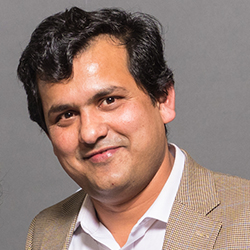
Santosh Mishra, PhD holds a PhD in Neuroscience from Frankfurt University, Germany and completed postdoctoral training at the National Institute of Dental and Craniofacial Research (NIDCR), NIH. His research focuses on the cellular and molecular mechanisms of pain and itch particularly in joints and skin diseases like osteoarthritis and eczema. Dr. Mishra has published numerous high-impact papers, serves as academic editor of PLoS One and associate editor for Frontiers in Pain Research and has received several awards for his Research Excellence.

Morika D. Williams, DVM, PhD, DACLAM is an accomplished veterinarian and researcher with a focus on pain mechanisms, assessment, and treatment. She obtained her B.S. degrees in Laboratory Animal Science and Animal Science from North Carolina Agricultural and Technical State University, Doctorate in Veterinary Medicine from North Carolina State University, and completed a residency in Laboratory Animal Medicine, becoming board-certified. In 2020, she earned her PhD in Comparative Biomedical Sciences at NC State, exploring the effects of early life injury on chronic pain such as osteoarthritis. Dr. Williams joined UNC Chapel Hill in April 2020 as a Clinical Fellow and Veterinarian, quickly advancing to Assistant Professor by November. Since March 2021, she’s directed the UNC Laboratory Animal Medicine Residency Program. Dr. Williams leads the Pain, Aging, and Interdisciplinary Neurobehavioral (P.A.I.N.) Laboratory, where she spearheads innovative research in behavioral neuroscience. Her work is dedicated to advancing acute and chronic pain management and assessment in newborns and adults, enhancing the quality of life in both animals and humans. She’s also committed to educating future scientists in biomedical research.
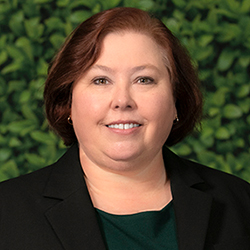
Tracey du Laney, PhD manages several of NCBiotech’s Science & Technology Development research grant funding programs that are designed to advance promising scientific discoveries and technologies developed in NC colleges, universities, and non-profit institutions towards commercialization. These grants fill critical funding gaps in stages where it is typically difficult to secure funding.
Dr. du Laney holds a bachelor’s degree in Biomedical Engineering from Duke University, a master’s degree in Biomedical Engineering from The University of Texas at Austin, and a Ph.D. in Biochemical Engineering from Duke. Prior to joining the North Carolina Biotechnology Center, Dr. du Laney co-owned/co-founded a niche independent consulting firm in Research Triangle Park specializing in technology assessments and commercialization, grant writing and evaluation, due diligence, and entrepreneurship/start-up strategic planning for life sciences companies.
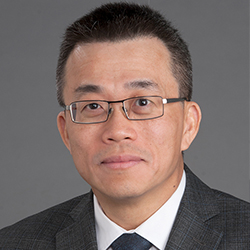
Mei-Chuan Ko, PhD research interests are focused on sensory neuroscience, addiction, and psychiatric disorders. His research team has established several clinically relevant measures in non-human primates to assess and compare the functional efficacy of experimental compounds and clinically used drugs. Along with the NIH HEAL Initiative, his research goal is to facilitate the research and development of non-addictive analgesics and the validation of novel pharmacotherapy for opioid addiction by using translational non-human primate models. His research team has discovered bifunctional mu opioid/nociceptin receptor partial agonists as safe and non-addictive analgesics with potential to treat opioid use disorder. Several compounds have been advanced to IND applications to FDA. He has published over 100 peer-reviewed research articles in top-tier journals, including Neuropsychopharmacology and Science Translational Medicine.
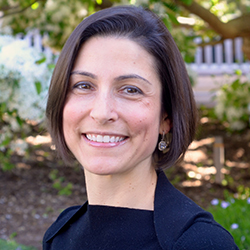
Andrea Nackley, PhD is an Associate Professor of Anesthesiology and Pharmacology and Associate Director of the Center for Translational Pain Medicine (CTPM) at Duke University. Her translational research program marries pain neurobiology, behavioral pharmacology, and molecular genetics in mouse and man to better understand mechanisms of and identify treatments for chronic ‘primary’ overlapping pain conditions. Her lab was the first to demonstrate a critical role for peripheral adrenergic receptor beta-3 in the development of chronic pain and neuroinflammation, which remains a primary research focus. Dr. Nackley is a standing member of the NIH Neurobiology of Pain and Itch study section and serves on the Board of Directors for the United States Association for the Study of Pain (USASP). In recognition of her scholarly activity in the Pain field, she received the John C. Liebeskind Career Scholar Award from the American Pain Society.
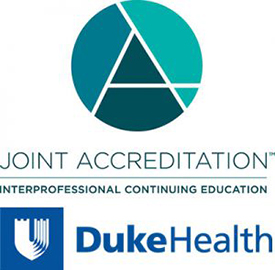
Joint Accreditation Statement
In support of improving patient care, the Duke University Health System Department of Clinical Education and Professional Development is accredited by the American Nurses Credentialing Center (ANCC), the Accreditation Council for Pharmacy Education (ACPE), and the Accreditation Council for Continuing Medical Education (ACCME), to provide continuing education for the health care team.
Provider Statement
Directly provided by the Duke University Health System Department of Clinical Education and Professional Development.
Education Credits
Category 1: Duke University Health System Department of Clinical Education and Professional Development designates this CE activity for a maximum of 4 AMA PRA Category 1 Credits™. Physicians should claim only credit commensurate with the extent of their participation in the activity.
How to Claim Credits
Register Duke OneLink account & activate Duke CE profile. It is REQUIRED to register a OneLink account in order to evaluate courses, get certificates, & obtain credits.
Download OneLink Account Instructions
Resolution of Conflicts of Interest
Duke University Health System Clinical Education and Professional Development has implemented a process to resolve any potential conflicts of interest for each continuing education activity in order to help ensure content objectivity, independence, fair balance, and the content that is aligned with the interest of the public.
Disclosure Statement
It is the policy of the Duke University Health System Clinical Education and Professional Development to require the disclosure of anyone who is in a position to control the content of an educational activity. All relevant financial relationships with any commercial interests and/or manufacturers must be disclosed to participants at the beginning of each activity.
Disclaimer
The information provided at this CME activity is for continuing medical education purposes only and is not meant to substitute the independent medical judgment of a physician relative to diagnostic and treatment options of a specific patient’s medical condition.
Special Needs
The Duke University School of Medicine’s Department of Anesthesiology is committed to making its activities accessible to all individuals. If any participant in this educational activity is in need of accommodations, please do not hesitate to notify us by phone or email in order to receive service. Please email Qin Zhang, MD or call at (919) 684-1384.
On behalf of the Duke Department of Anesthesiology, we would like to thank the following organizations for their contributions. Continued support from organizations such as these is vital to the ongoing success of unrestricted education, research and development. This CME activity is supported in part by an unrestricted sponsorship grant from the Comparative Pain Research and Education Centre at NC State University.
Thank you to the following symposium partners:
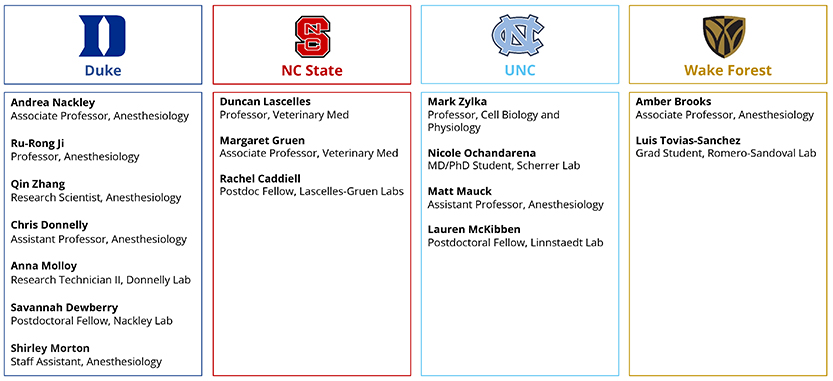
- The information provided at this CME activity is for continuing medical education purposes only. It is meant for the sole use of persons intending to further their understanding of pain mechanisms and multi-modal treatment approaches and is NOT meant to substitute the independent medical judgment of a physician relative to diagnostic and treatment options of a specific patient’s medical condition.
- Every effort has been made to supply information that is accurate and current. However, Duke Anesthesiology and the Center for Translational Pain Medicine at Duke University Medical Center does not accept responsibility for errors or omissions and accepts no liability for any loss or damage howsoever arising.
- Participants must make their own travel arrangements, including lodging and boarding during the activity.
Duke School of Medicine requires CME faculty (speakers) to disclose to attendees:
when products or procedures being discussed are off-label, unlabeled, experimental and/or investigational (not FDA approved); and any limitations on the information that is presented such as data that is preliminary or that represent ongoing research, interim analyses and/or unsupported opinion.
Faculty at this meeting may discuss information about pharmaceutical agents that is outside of the US Food and Drug Administration approved labeling. This information is intended solely for continuing medical education and is not intended to promote off-label use of these medications. If you have questions, contact the medical Affairs department of the manufacturer for the most recent prescribing information.
Venue
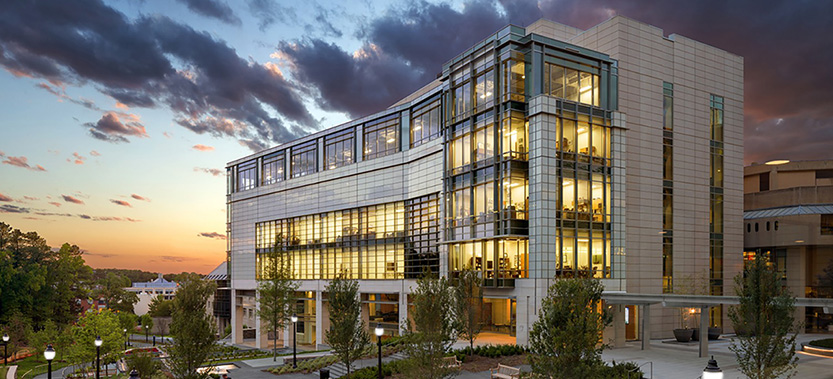
The Mary Duke Biddle Trent Semans Center for Health Education is the main educational facility for the Doctor of Medicine (M.D.) program. The six-story, 104,000-square-foot health education building opened to students in 2013 and features a floor dedicated to simulation laboratories that can transform from mock clinical exam rooms to surgery suites and emergency rooms.
Medical education administrative offices are located on 8 Searle Center Drive, Durham, NC 27710, behind the Bryan Research building and next to the Medical Center Library & Archives.